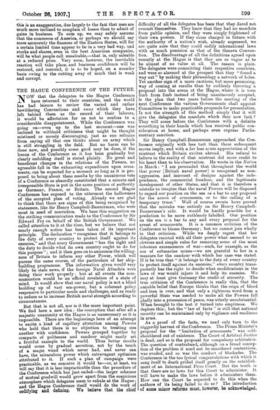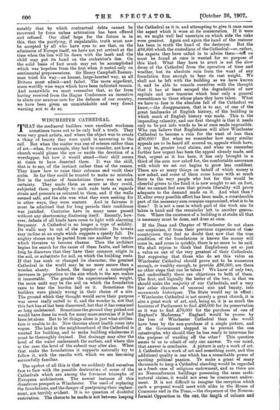THE HAGUE CONFERENCE OF THE FUTURE. N ow that the delegates
to the Hague Conference have returned to their countries, and the world has had leisure to review the varied and rather bewildering Conventions and vceux which they have . left behind them as the record of their labours, it would be affectation for us not to confess to a considerable disappointment. While the Conference was going on—even up to the last moment—one was inclined to withhold criticisms that might be thought mistimed or merely discouraging, just as one refrains from saying all that one thinks about an army which is still struggling in the field. But no harm can be done now, and possibly some good may be done, if the lesson of the Conference as it has been gradually but clearly unfolding itself is stated plainly. No great and beneficent changes in the relations of the Powers, no agreeable fall in the exhausting expenditure upon arma- ments, can be expected for a moment so long as it is pro- posed to bring about these results by the unanimous vote of a Conference so absurdly constituted that a minute and irresponsible State is put in the same position of authority as Germany, France, or Britain. The second Hague Conference has exposed to the uttermost the hollowness of the accepted plan of voting. Already we are glad to think that there are signs of this being recognised by statesmen, like Sir Henry Campbell-Bannerman, who were most in need of conviction. We base this suggestion on the striking communication made to the Conference by Sir Edward Fry on behalf of the British Government. We called attention to it at the time, but we believe that not nearly enough notice has been taken of its important principle. The declaration " recognises that it belongs to the duty of every country to protect itself against its enemies," and that every Government "has the right and the duty to decide what its own country ought to do for this purpose " ; and it then goes on to announce the willing- ness of Britain to inform any other Power, which will pursue the same course, of the particulars of her ship- building programme. The information given would very likely be stale news, if the foreign Naval Attaches were doing their work properly ; but at all events the com- munication would be an official revelation of a state of mind. It would show that our naval policy is not a blind building up of vast sea-power, but a coherent policy responsive to particular needs and challenges, and as ready to reduce as to increase British naval strength according to circumstances.
But that is not all, nor is it the more important point. We find here a new idea : the conception that after all a majestic unanimity at the Hague is as unnecessary as it is impossible. There are the beginnings here of an attempt to excite a kind of capillary attraction among Powers who hold that there is no objection to treating one another with confidence. Powers grouped together by compacts of politeness and candour might easily set a fruitful example to the world. Thus better results would come by gradual accretion, not by the touch of a magic wand which never had, and never can have, the miraculous power which extravagant optimism attributed to it. If such a plan of campaign were practicable, as we conceive it would be—or, at least, we will say that it is less impracticable than the procedure of the Conference which has just ended—the larger schemes of mutual goodwill would grow apart from the suspicious atmosphere which delegates seem to exhale at the Hague; and the Hague Conference itself would do the work of codifying and defining. We believe that the chief difficulty of all the delegates has been that they dared not commit themselves. They knew that they had no mandate from public opinion, and they were simply frightened of their own powers. If they came charged in future with the authority of a nation's wish, already expressed, we are quite sure that they could codify international laws with as much precision as that of the Geneva Conven- tion. The disadvantage of all the definitions agreed upon recently at the Hague is that they are so vague as to be almost of no value at all. The reason is plain. The delegates were committing their respective countries, and were so alarmed at the prospect that they " found a way out " by making their phraseology a. network of holes. Yet another sign of a more cautious, but more promising, way of coming at results than by suddenly throwing a proposal into the arena at the Hague, where it is torn limb from limb instead of being unanimously accepted, is the plan that two years before the meeting of the next Conference the various Governments shall appoint Committees to make practicable proposals for presentation. Is not the strength of this method simply that it will give the delegates the mandate which they now lack ? They will come before the Conference with a, definite something in their hands which has received public con- sideration at home, and perhaps even express Parlia- mentary sanction.
Sir Henry Campbell-Bannerman approached the Con- ference originally with less tact than these subsequent moves imply, and with a far less acute appreciation of the mistrust which Britain excites abroad. His refusal to believe in the reality of that mistrust did more credit to his heart than to his observation. He wrote in the Nation in March : " I am persuaded that throughout the world that power [British naval power] is recognised as non- aggressive, and innocent of designs against the inde- pendence, the commercial freedom, and the legitimate development of other States, and that it is therefore a mistake to imagine that the naval Powers will be disposed to regard our position on the sea as a bar to any proposal for the arrest of armaments, or to the calling of a temporary truce." Well of course events have proved that the mistake was entirely on Sir Henry Campbell- Bannerman's side. It would be hardly possible for a prediction to be more ruthlessly falsified. Our position on the sea is a bar to any and every proposal for the arrest of armaments. It is a common criticism of the Conference to blame Germany ; but we cannot join wholly in that criticism. While we deeply regret that her delegates resisted with all their power what seemed to us obvious and simple rules for removing some of the most inhuman excrescences of war—such, for example, as the use of submarine mines—we are grateful to her in a measure for the candour with which her case was stated. If it be true that " it belongs to the duty of every country to protect itself against its enemies," every country trans- parently has the right to decide what modifications in the laws of war would injure it and help its enemies. We may at least give Germany the credit of sincerity. The true criticism of the Conference is really this, that the amiable belief that Europe thinks that the reign of blood and iron is over, and that only a righteous word from a powerful State was needed to make all the Powers fall gladly into a procession of peace, was utterly unsubstantial. When brought to the test it turned into emptiness. We deplore this ; but the " law of facts " is still that national security can be maintained only by vigilance and readiness in arms.
As a proof of the facts, we need only turn to the niggardly harvest of the Conference. The Prime Minister's proposal for the " limitation of armaments " was cold- shouldered out of existence. The Court of Arbitral Justice is dead, and so is the proposal for compulsory arbitration. The question of contraband, although on a broad concep- tion of the problem it need not be considered contentious, was evaded, and so was the conduct of blockades. The Conference in the too lyrical congratulations with which it sang itself to death prided itself greatly on the establish- ment of an International Prize Court. But the truth is that there are no laws for this Court to administer. It will have to make the laws before it administers them. How can the Court be expected to do this when the authors of its being failed to do so ? The introduction
of some minor reforms must, however, be acknowledged,
notably that by which contractual debts cannot be recovered by force unless arbitration has been offered and refused. Our chief hope for the future is in this, that the purifying, if unpalatable, truth must now be accepted by all who have eyes to see that, on the admission of Europe itself, we have not yet arrived at the time when the lion will lie down with the lamb and the child may put its hand. on the cockatrice's den. On the solid basis of fact much may yet be accomplished which was hopeless from the first when it rested only on sentimental prepossessions. Sir Henry Campbell-Banner- man tried his way—an honest, large-hearted way, as all Britons must admit—and failed. The more expedient, more worldly wise ways which have been indicated remain. And meanwhile we must remember that, so far from having received from the Hague Conference an incentive to abate our anxious care for the defence of our country, we have been given an unmistakable and very direct warning not to do so.











































 Previous page
Previous page